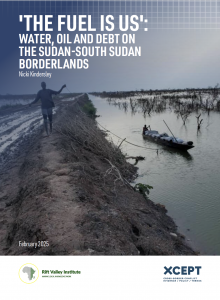South Sudan and Sudan’s borderlands are run by a patchwork of armed authorities. Since early 2019, when opposition forces were effectively wiped out, these zones of control have remained relatively fixed, even as the war in Sudan drew close to the Nuba Mountains. Although there have been changes since the onset of the war—including the redirection of trade routes, workers being unable to undertake the 2023 migrant work season, and the likely further spread of oil pollution—the impact of disrupted oil incomes is only marginally relevant to the borderland’s economic systems and public authorities.
SUMMARY
- The past 15 years have seen overlapping crises restructure the region’s social and economic worlds, with war, floods, droughts and inflation eroding the social and financial security systems of the already poor and newly impoverished. Many have become trapped in camps, towns and drier highlands where taxes, travel costs and rents delimit onward opportunities. Many workers are now forced to make daily calculations of calorie intake and there is a growing dependence on waterlily as a food substitute.
- The poorest refugees and displaced people have been pushed into risky work in growing market economies run on rents and debts. This has resulted in increasingly unequal class relations and wealth systems, prompting some to protest against these exploitative dynamics and others to try to cross back to Sudan for better-paid work.
- All of the above has created a useful labour trap for the extractive commercial economy and its security apparatus, which benefits from a displaced and urbanized population reliant on low-paid piecework. The wage-depressed labour market provides the manpower needed to securitize the oilfields, farms, mines, markets, businesses and compounds, as well as the cheap manual work needed in farms, transport systems and markets, all at a low cost and high returns for investors.
- With now-regular flooding crises, droughts, pollution and pests, sustained access to good land will determine who is able to (re)build family security, and who will remain as low-waged and mobile workers. Increasing land commercialisation and rental markets will propagate absolute claims to land and grazing rights, risking confrontations over the rights to safe life on this borderland.
We have been dying of snake bites, and coolness. We are giving birth to deformed babies. So I sing this song to present our suffering. My song is like in a question form, searching for answers:
Who opened us the ocean of water?
Who is killing our elderly people with water?
Who kills our orphans with water?
Who is killing our widows with water?
Who opened the water that is killing our generations?
I asked all the African nations, who is killing us with water?
I asked the Christians who opened the oceans, whose water is killing our people?
Oh, I know the answer! It is the hatred whose agent is the hunger. Hunger is killing us.
-Elizabeth Nyanduay Bidiet
ACKNOWLEDGEMENTS
Project researchers
Mawal Marko Gatkuoth and Manal Abdulaziz Mudir
The research team collectively conceptualised the project and its methodology. The project researchers were responsible for the investigation and validation. The project lead was responsible for the formal analysis, data curation, project administration, supervision, and writing.
Research assistants
Linda Madeng Gatduel, Nyaphean Phan Char, Bisal Hassan, Razaz Juma and Gisma Yousif
This report is a product of the Cross-Border Conflict Evidence, Policy and Trends (XCEPT) research programme. XCEPT brings together leading local and international experts to examine conflict-affected borderlands, how conflicts connect across borders, and the factors that shape violent and peaceful behaviour. The programme carries out research to better understand the causes and impacts of conflict in border areas and their international dimensions. Funded by UK International Development, XCEPT offers actionable research to inform policies and programmes that support peace, and builds the skills of local partners. The views expressed do not necessarily reflect the UK government’s official policies.




